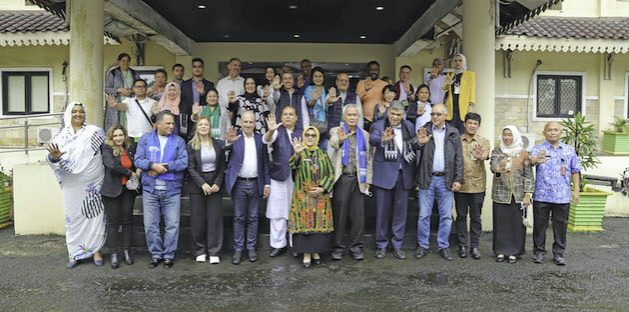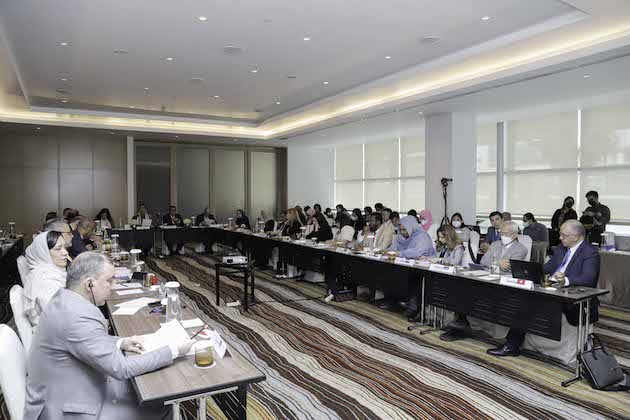Parliamentarians Pledge to Act on Grim Realities of Child Marriage, Gender-Based Violence

JOHANNESBURG, Mar 13 (IPS) - Child marriage, gender-based violence (GBV), sexuality education, religion, and tradition came under the spotlight during a conference, Arab and Asian Parliamentarians’ Meeting to Follow-Up on ICPD25 Commitments: Addressing Youth Empowerment and Gender-Based Violence, held in Jakarta, Indonesia.
Professor Keizo Takemi, MP Japan, Chair of the Asian Forum of Parliamentarians on Population and Development (AFPPD), reminded delegates that GBV is on the rise in conflict situations, during disasters, and during the prolonged COVID-19 pandemic.
“Furthermore, children in some countries are at higher risk of child marriage due to economic pressures and school closures caused by the pandemic. Globally, about one in five (21 percent) girls are married before the age of 18. Child marriage not only deprives girls of educational opportunities, but early pregnancy and childbearing also come with a higher risk of complications and death.
Pierre Bou Assi, MP Lebanon, President of the Forum of Arab Parliamentarians on Population and Development (FAPPD), told the delegates it was necessary to acknowledge and confront the issues of GBV in the region. It was clear from a series of case studies from the Arab and Asia Pacific region that while there has been some success, there was plenty of work to do.
Dr Dede Yusuf Macan Effendi, MP for Indonesia and Chair of the Indonesian Forum of Parliamentarians on Population and Development (IFPPD), said the country had had some successes – for example, the incidence of GBV dropped from 33 percent in 2016 to 26 percent in 2021. However, many incidents were unreported, and this was considered “the tip of the iceberg.”
Effendi noted the region’s issues – like the high proportion of child marriage and exposure to HIV/Aids.
Dr Hasto Wardoyo, the chairperson of BKKBN, said parliamentarians played a critical role, with various “studies suggesting that the government should take steps such as increasing care capacity and access to services such as health services, social services, developing children’s abilities, opening and equalizing access, strengthening family and social bonds.”
A professor from UIN Jakarta, Dr Nur Rofiah, gave a perspective from Islam and said the religion had a concept of maslahah or goodness. This recognizes women’s bodily experiences are different from men’s, and it would be important to consider actions that “cause painful experiences for women’s bodies, including gender-based injustice.”
Rofiah emphasized the adverse effects of child marriage for women saying that child brides lost out on their childhood, dropped out of school, experienced domestic violence, often were adversely impacted by divorce, were stigmatized by being widowed, lacked competitiveness in the work environment, very often experienced single parenthood and were susceptible to child marriage.
COVID-19 had impacted the ICPD25 programme of action, especially on health care, with Malaria and tuberculosis neglected, as was gender equality, said Nadimul Haque, an MP in India. The Regional Sexual and Reproductive Health Adviser, UNFPA ASRO Professor Hala Youssef, developed this theme, saying policymakers need to change strategy during this decade of action to 2030 – without which it would be difficult to achieve the goals. She called on delegates to move from the idea of “funding” ICPD goals to “financing” them. Funding was reliant on the government, but financing involved the wider society.

Youssef called on parliamentarians to concentrate on the needs of young people, people with disabilities, universal health coverage, budgetary and financial allocations, social determinants of health, maternal deaths among adolescent girls, strengthening health workforce numbers, and capacity building.
The case study presented by Professor Ashraf Hatem, an MP from Egypt, showed that his country’s Universal Health Insurance (UHI) would soon remove the issue of what he called “catastrophic health expenditure” of the poor. The scheme rolled out in phases, would decrease out-of-pocket expenditure from 62 percent to 32 percent in 2032.
The government was subsidizing about 35 percent of the population. He gave an example of open heart surgery done in a UHI facility that would cost a patient 300 Egyptian pounds or about USD 10.
A grim picture of the social, psychological, economic, and medical burdens resulting from unintended pregnancies in her country was painted by Soukaina Lahmouch, an MP from Morocco. While there had been an improvement in the legal arsenal regarding abortion, marriage, and access to quality health services, much was still to be done. She explained that in Morocco, about 153 newborns are born out of wedlock each day, of which 24 children are abandoned at birth.
About 11,4 percent of pregnant women still received no prenatal care; however, in rural areas, about one-fifth of mothers received no prenatal care, and 13.4 percent gave birth without the assistance of qualified personnel.
“More than half of the women affected by poverty do not seek follow-up during pregnancies,” Lahmouch said, adding that education was a determinant, with almost all women with secondary school education giving birth in a health facility, but those without education more likely to give birth at home.
About 12 percent of women were married under 18, and a recent survey showed that 62.8 percent of women aged between 18 and 64 experienced violence during the year before the survey.
Dr Suhail Alouini, a former MP of Tunisia, quoted a World Bank study, saying 18 percent of women were married before 18 in the Middle East/North Africa (MENA) region. While in many countries, the legal minimum age for marriage is set at 18, there were exceptions for the marriage of underage individuals due to court decisions.
Alouini said conflict and displacement increased the risk of GBV, including sexual violence and forced marriages.
“In some conflict-affected areas in the Arab region, the rates of child marriage have increased, and the COVID-19 pandemic has led to a surge in reports of GBV in the Arab region and around the world. The pandemic also disrupted efforts to prevent child marriage as school closures and economic hardships made girls more vulnerable to early marriage.”
He noted that GBV and child marriage requires a comprehensive and multi-sectorial approach focusing on prevention response and political leadership, and ICPD25 recommendations provide a road map for action emphasizing the importance of investing in data and research and engaging a wide range of stakeholders and political leadership. The role of parliamentarians is critical in addressing GBV and child marriage.
Laissa Alamia, MP of Bangsamoro Transition Authority, Philippines, spoke about the situation in the self-governing region and the Philippines.
“One in four Filipino women aged 15 to 49 experienced physical, emotional, and sexual violence by their partner or husband. One in six Filipino girls finds herself married before hitting the age of 18.”
This is the case even though the Philippines is known for its “most vibrant woman’s rights movement and the most comprehensive anti-GBV legal frameworks and mechanisms in the world.”
Bangsamoro region is disproportionately poor, and 62 percent of the women belonged to poor communities; the approximate number of child brides was 88,600 out of a population of 2.46 million women.
He said ethnic minority Muslim women continue to face different forms of discrimination, and the code of Muslim personal laws in the country gives a prescribed age for marriage of 15 for men and 15 or at puberty for females.
Alamia said the Philippines law, which prohibits child marriages, is not universally accepted by all communities and brings up religious freedom debates.
Dr Jetn Sirathranont, MP Thailand, noted in his closing remarks that there was still a long way to go to achieve the ICPD25 programme of action, but he hoped this conference would give an impetus to finding solutions.
Tomoko Fukuda, Regional Director of IPPF ESEAOR, encouraged parliamentarians to continue their work on the ICPD programme of action, despite conflicting priorities.
“So we as the older generation have to be committed to ensuring that the world is a better place for the young people and the children born into this world,” she said.
Anjali Sen, UNFPA Representative in Indonesia, shared a study by Schneider and Hirsch in 2020 that showed that “comprehensive sexuality education meets the characteristics of an effective GBV prevention ... comprehensive sexuality education is based on human rights and gender equality.”
She called for it to be implemented, stating that it needed support and involvement from teachers, parents, healthcare providers, young people, and the government. Parliamentarians had a role in ensuring that policy and financial support were available.
Note:. This conference was organized by APDA and FAPPD, hosted by IFPPD and supported by UNFPA and Japan Trust Fund (JTF).
IPS UN Bureau Report
Follow @IPSNewsUNBureau
Follow IPS News UN Bureau on Instagram
© Inter Press Service (2023) — All Rights Reserved. Original source: Inter Press Service

